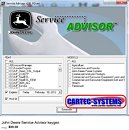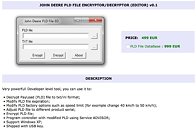- Joined
- Oct 9, 2007
- Messages
- 47,538 (7.47/day)
- Location
- Hyderabad, India
| System Name | RBMK-1000 |
|---|---|
| Processor | AMD Ryzen 7 5700G |
| Motherboard | ASUS ROG Strix B450-E Gaming |
| Cooling | DeepCool Gammax L240 V2 |
| Memory | 2x 8GB G.Skill Sniper X |
| Video Card(s) | Palit GeForce RTX 2080 SUPER GameRock |
| Storage | Western Digital Black NVMe 512GB |
| Display(s) | BenQ 1440p 60 Hz 27-inch |
| Case | Corsair Carbide 100R |
| Audio Device(s) | ASUS SupremeFX S1220A |
| Power Supply | Cooler Master MWE Gold 650W |
| Mouse | ASUS ROG Strix Impact |
| Keyboard | Gamdias Hermes E2 |
| Software | Windows 11 Pro |
Tractors are some of the most beloved and benign pieces of automotive technology, and some of the very first applications of the internal combustion engine, after cars. Tinkering with the classic free-breathing (natural aspiration) engines of old tractors is something arguably every mechanical engineer has ever done. Over the ages however, tractors and other farm equipment have gotten increasingly complex. The engines became smaller (and hence more fuel-efficient), and technologies such as turbochargers and electronic fuel injection shored power and torque back up to the levels of larger free-breathing engines. Running the engine is now handled by a small embedded computer called the ECU (engine control unit). Likewise, running the various ancillaries on farming equipment such as harvesters have been governed by electronics. The more there's electronics, the less there is that a spanner can fix, and that has become a big problem in America.
Some popular farm equipment manufacturers such as John Deere have taken greed cleverly disguised as "quality assurance" to the same levels as the Apple iPhone. On the iPhone, you can't just install third-party software that hasn't been vetted by Apple and distributed through the App Store. Free software activists have criticized this for stiffing innovation, because Apple's software doesn't give users unrestricted access to the hardware that they've paid for. John Deere and some of its competitors are in the same league. They've outfitted their tractors and farm equipment with electronics that make it practically impossible to perform "unauthorized" repair. If your crop is up for harvest and your harvester is throwing a fit, you have no option but to take it back to a John Deere service center, or other repair shops "authorized" by the company. If you've replaced a part yourself, a guy with a laptop has to come over to your farm, and "activate" that part. American farmers aren't taking kindly to this, and help is coming from the most unlikely of places.

Back in October 2016, John Deere made its customers sign a license agreement to purchase their equipment, which forbids unauthorized repair or modification; and prevents farmers from suing the company for "crop loss, lost profits, loss of goodwill, loss of use of equipment … arising from the performance or non-performance of any aspect of the software (driving the equipment)." This presents an existential threat to farmers, as their livelihoods are at the mercy of receiving product service from only one source (manufacturer and its licensed shops), and prevents them from fixing the equipment on their own, should they go down at an inopportune time.
Here's what's wrong. John Deere wants to control the supply of spare parts for its products. Each time you replace a major part (eg: the transmission case), the part change has to be updated onto the ECU. The ECU is connected all major components of the tractor, and stores a table with their electronic serial numbers. When a part is replaced, its serial number has to be registered with the ECU, so it can validate that a genuine John Deere part has been installed. Trouble is, this validation costs some serious dime - John Deere charges $230, plus $130/hr for an "authorized mechanic" to drive into your farm and validate the part by plugging in the ECU to a laptop with the validation software.



Activists are pushing state-level legislation in the US state of Nebraska, that invalidates John Deere's agreements, and grants farmers the "right to repair" their equipment. In the meantime, farmers are taking to the Internet, for a Ukrainian custom firmware available on certain Eastern European invite-only, paid online forums. Farmers can flash the ECU and other electronics of their farm-equipment with this custom firmware, which effectively jail-breaks them, making them easier to repair. This has sprung up an entire industry of ECU modding equipment and unauthorized software, which isn't free, but is a must-have for any farmer. The key-generator that spits out part-validation keys goes for $99, firmware PayLoad (PLD) file encryptor/decryptor, which gets through John Deere's encryption, goes for $499, and cables that plug your tractor to a PC, for about $80. They may seem expensive and perhaps even predatory, but for farmers who intend to run their tractors for over a decade, it's a windfall in long-term savings.
This brings back the classical debate about whether you truly own the hardware of a $1000 iPhone, and if not, why not. When farmers pay hundreds of thousands of dollars for their farm equipment, shouldn't they completely own it, and use/repair it as they please? Or has purchasing a tractor become purchasing a service rather than a product? Tell us in the comments below.
View at TechPowerUp Main Site
Some popular farm equipment manufacturers such as John Deere have taken greed cleverly disguised as "quality assurance" to the same levels as the Apple iPhone. On the iPhone, you can't just install third-party software that hasn't been vetted by Apple and distributed through the App Store. Free software activists have criticized this for stiffing innovation, because Apple's software doesn't give users unrestricted access to the hardware that they've paid for. John Deere and some of its competitors are in the same league. They've outfitted their tractors and farm equipment with electronics that make it practically impossible to perform "unauthorized" repair. If your crop is up for harvest and your harvester is throwing a fit, you have no option but to take it back to a John Deere service center, or other repair shops "authorized" by the company. If you've replaced a part yourself, a guy with a laptop has to come over to your farm, and "activate" that part. American farmers aren't taking kindly to this, and help is coming from the most unlikely of places.

Back in October 2016, John Deere made its customers sign a license agreement to purchase their equipment, which forbids unauthorized repair or modification; and prevents farmers from suing the company for "crop loss, lost profits, loss of goodwill, loss of use of equipment … arising from the performance or non-performance of any aspect of the software (driving the equipment)." This presents an existential threat to farmers, as their livelihoods are at the mercy of receiving product service from only one source (manufacturer and its licensed shops), and prevents them from fixing the equipment on their own, should they go down at an inopportune time.
Here's what's wrong. John Deere wants to control the supply of spare parts for its products. Each time you replace a major part (eg: the transmission case), the part change has to be updated onto the ECU. The ECU is connected all major components of the tractor, and stores a table with their electronic serial numbers. When a part is replaced, its serial number has to be registered with the ECU, so it can validate that a genuine John Deere part has been installed. Trouble is, this validation costs some serious dime - John Deere charges $230, plus $130/hr for an "authorized mechanic" to drive into your farm and validate the part by plugging in the ECU to a laptop with the validation software.



Activists are pushing state-level legislation in the US state of Nebraska, that invalidates John Deere's agreements, and grants farmers the "right to repair" their equipment. In the meantime, farmers are taking to the Internet, for a Ukrainian custom firmware available on certain Eastern European invite-only, paid online forums. Farmers can flash the ECU and other electronics of their farm-equipment with this custom firmware, which effectively jail-breaks them, making them easier to repair. This has sprung up an entire industry of ECU modding equipment and unauthorized software, which isn't free, but is a must-have for any farmer. The key-generator that spits out part-validation keys goes for $99, firmware PayLoad (PLD) file encryptor/decryptor, which gets through John Deere's encryption, goes for $499, and cables that plug your tractor to a PC, for about $80. They may seem expensive and perhaps even predatory, but for farmers who intend to run their tractors for over a decade, it's a windfall in long-term savings.
This brings back the classical debate about whether you truly own the hardware of a $1000 iPhone, and if not, why not. When farmers pay hundreds of thousands of dollars for their farm equipment, shouldn't they completely own it, and use/repair it as they please? Or has purchasing a tractor become purchasing a service rather than a product? Tell us in the comments below.
View at TechPowerUp Main Site






